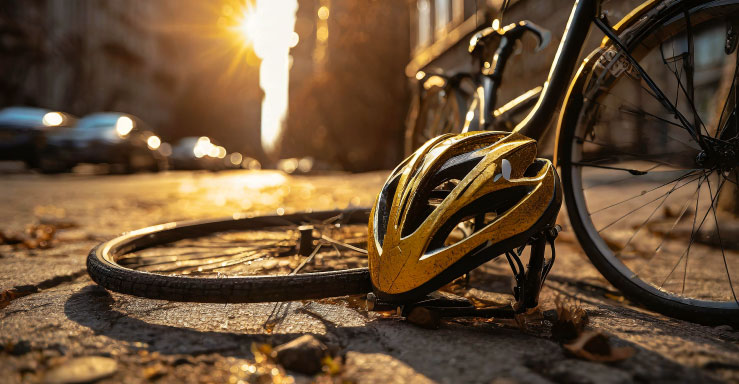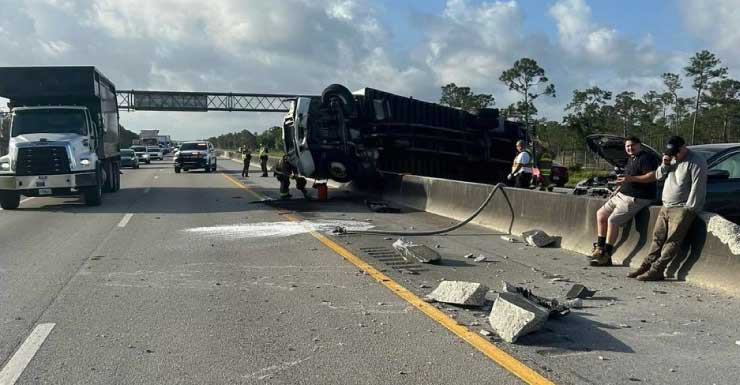Three years after a bicyclist was killed in a head-on crash with a speeding Miami-Dade police officer, a jury declared the cop negligent and awarded $3 million to the man’s widow and daughter.
But because of a state cap that shields employees at police departments, schools, hospitals and other government entities from liability, the victim’s survivors are limited to $300,000 in damages, must take their case to the Florida Legislature and persuade lawmakers to pass a special claim bill to exceed the sovereign immunity limit.
A bill in the Florida Senate, which faces opposition from counties, cities and insurance companies, would increase immunity caps on compensation and revamp the claims process.
Miami-Dade County offered the cyclist’s widow $49,000 to settle the case before trial.
“It is beyond surreal to have the needless death of my husband treated so dismissively, and now to do the trial all over again in Tallahassee,” Jeishy Zerpa said. “Any other person in another line of work who is held liable or who acted irresponsibly or illegally would be punished instead of protected. Why do we have this double standard of immunity for the police?”
Cop speeding in 40-mph zone: widow’s lawyer
A Miami-Dade Circuit Court jury sided 6-0 with Zerpa and her attorneys, who argued Officer Christopher Bendana was driving 70 mph in a 40 mph zone after he was dispatched to assist another officer with a non-emergency — a report of mailbox theft or vandalism.
“Outrageous and insulting,” attorney Luis Suarez said of the county’s offer. “Miami-Dade County doesn’t care because they have sovereign immunity. But a jury saw fit to award 60 times more.”
Zerpa’s husband, Juan Carlos Martinez, 30, died Feb. 27, 2021, while on his regular Saturday morning group ride near Black Point Park and Marina near Cutler Bay.
Bendana was speeding toward a peloton of 20 cyclists — a common sight on Southwest 248th Street at that time of day — as they pedaled west and he traveled east. The cyclists warned each other to slow down and edge to the right as they saw the patrol car coming with lights flashing and siren blaring.
Martinez, an experienced cyclist and triathlete, brushed wheels with another cyclist, causing him to fall. Bendana testified he saw Martinez fall and roll into his lane, yet he did not slow down, even though the cyclists waved at him vigorously, and did not brake for 50 feet after striking Martinez, attorneys demonstrated in their reconstruction.
“Even speeding wildly the officer had time to evade the cyclist, and had he been going 40 mph he would have had time to stop,” said attorney Mark Heise, Suarez’s partner. “After the collision, he dragged the body across the grass and ran over the body until he stopped 180 feet later.”
County: Crash was unavoidable
The county’s attorneys argued at trial two weeks ago that Bendana was going 50-58 mph when Martinez “tragically fell into the path” of Bendana’s patrol car, and the collision was unavoidable. Because Bendana was not charged with a crime, he was “not found to be at fault for the accident,” the county said. He was given a written reprimand for speeding, and for activating his emergency signals without authorization, violations of police department policy.
“Even though we see police officers speeding all the time, they are not entitled to speed; that is a fallacy,” Suarez said. “It depends on the type of crime they are responding to. In this case, he had absolutely no reason to speed. He was not dispatched to an emergency but rather a property crime — two people vandalizing or stealing from mailboxes. He was sent as a backup to a 27-15 call. They tried to justify it by saying he was concerned about the other officer who was the primary responder.”
Miami-Dade officers dispatched to an emergency with possible or actual harm to life are allowed to go 10 to 20 mph over the speed limit. Police agencies have strict policies on speed in order to avoid collateral injuries or fatalities.
Bendana also failed to activate his body camera upon dispatch, another policy violation. He did not press the record button until after the collision.
“Had he hit record when required we would have seen his speed and the collision,” Suarez said.
Bendana was promoted to detective a year later.
“If that police officer had followed the law, J.C. would still be alive,” Zerpa said of Martinez, who was an event producer and an employee at Mack Cycle and Fitness. “I’ll go to bed every night with the thought that my husband’s death was avoidable.”
Left behind 9-month old daughter
The couple’s daughter Miranda was 9 months old when her father died. They live in Buena Vista. Zerpa is a human resources manager at a hotel.
“We went to place some flowers at the crash site and Miranda asked, ‘When is Papi going to come from heaven and get his flowers?’” Zerpa said.
Government agencies in Florida are protected by laws that limit their liability and place a cap of $200,000 on payment per person and $300,000 per incident.
Those caps can be exceeded only if legislators pass a claim bill in favor of the victim. Zerpa’s attorneys will now have to draft a bill, find a legislator to sponsor it, and win a vote in Tallahassee in order to collect damages of more than $300,000 for her and her daughter, now 3 years old.
“We will have to basically re-try this case — and Jeishy will have to relive the tragedy — and convince the state to pay this claim,” Suarez said. “It’s far from automatic and sometimes it can take more than one legislative session. There have been cases that took 10 years. We’ll be at the mercy of politics.
“It’s an unfair process that enables government and insurance companies to delay or reduce compensation to those who have been harmed.”
Government agencies say the immunity caps are a necessity because of their exposure to liability and the high cost of insurance.
“In the private world, a company held liable would have insurance to cover the claim,” Suarez said. “If I ran a 1,000-employee business with a fleet of vehicles, I would analyze my exposed risk and purchase insurance to cover that risk. If I didn’t have enough, I could go bankrupt. But government entities say they can’t afford more insurance, and they don’t need to buy it because they have immunity.”
Florida Senate bill would raise caps
A bill in the Florida Senate (SB 472) would double the caps to $400,000 and $600,000, and reform the lengthy and unpredictable claims process. If passed, the new law would give more discretion to cities, counties, police departments, school districts and hospitals to settle cases for higher amounts. Currently, some insurance policies require the government entity to go to trial, and, if they lose, to contest the victim in the state claims process.
“Every year, local governments come to us and ask for more control and power,” said Sen. Jason Brodeur, R-Sanford, the bill’s sponsor. “We’re giving it to them. We want to help them manage risk better. In cases where you did it, you were negligent, you’re liable — you need to carry insurance. If small governments say they can’t afford it, they need to be absorbed into county government.”
The Martinez case never should have gone to trial, said Stephen Cain, a Miami lawyer and president of the Florida Justice Association, which represents plaintiffs’ attorneys and supports the bill.
“Those are the kinds of cases that should be settled out of court but they are not because of insurance companies’ sinister tactic of not allowing government to settle, and slow-walking or creating a shell game so they don’t have to pay,” Cain said. “They’ll hire a lobbyist to fight the claim bills.
“Our goal is to make it less arduous for families who do not want a payday, who do not want a trial; they want a just resolution. I feel for the spouse and child who will be put through the wringer again and may not see compensation for a long time.”
Sovereign immunity evolved from the historical notion that the “King could do no wrong.” Florida maintained absolute immunity until 1973. The caps have not increased since 2010.
Florida’s caps among the lowest in the country
Florida’s sovereign immunity caps — lower than those in 90 percent of U.S. states, including Georgia’s $1 million and $1.3 million caps, according to Brodeur — make it difficult for victims or survivors to find a lawyer to take their case. Suarez agreed to represent Zerpa knowing his expenses will likely exceed the fees he collects because he is a cyclist himself and because “it’s important to fight abuses of power,” he said.
“We field cases against sovereign hospitals and doctors that we can’t pursue because the caps are so low and we know that filing a claim bill could take years,” Cain said.
The Martinez case represents another facet of Florida’s insurance crisis, Cain said.
“It has gotten grotesque up here,” Cain said from the legislative session in Tallahassee. “Despite promises, we are not seeing any rate relief for policy holders, yet insurance companies are making record profits.”
The Senate bill is opposed by the Florida Association of Counties, the Florida League of Cities, the Safety Net Hospital Alliance of Florida, Miami-Dade County, Broward County and the Panhandle Area Educational Consortium, which represents rural school districts.
Lawyers for those organizations told legislators the bill would force them to pay higher insurance costs and would increase the number of cases against them.
“When there’s a bigger pot of money available, I use this phrase, when the honey pot is bigger, there will be more bears coming for it,” said Mark Delegal, general counsel of the Safety Net Hospital Alliance of Florida, which represents public, teaching and children’s hospitals, including Jackson Health System, Nicklaus Children’s Hospital, Mount Sinai Medical Center, Broward Health and Memorial Healthcare System. He said patients will face higher hospital bills if hospitals have to spend millions more on insurance.
Rep. Fiona McFarland, R-Sarasota, introduced a similar bill in the state House after hearing claim bills that “broke my heart,” she said. “I heard terrible story after terrible story and I looked at the amount of money they were getting and I thought that is not enough for a life that’s been ruined, frankly.”
Zerpa and Suarez said they hope what happened to Martinez and their effort to collect damages will shine a light on a system they say is rigged against victims.
“The police officer ran over and killed my husband because he was speeding, but he has continued with his life after a slap on the hand,” Zerpa said. “My daughter and I face a lifetime of questions.”
Revitalizing Your Road to Recovery: Ovadia Law Group’s Expertise in Car Accidents
In the aftermath of a car accident, Ovadia Law Group emerges as your dedicated legal partner, ready to steer you towards a smoother path to recovery. Our seasoned team of attorneys specializes in car accident cases, possessing the expertise to guide you through the complexities of the legal process.
Calling 1-800-674-9396 not only connects you with Ovadia Law Group but initiates a crucial free consultation. This conversation transcends mere legal advice; it’s an opportunity to discuss the specifics of your case, understand your rights, and explore tailored legal strategies. Ovadia Law Group prioritizes personalized attention, ensuring you feel supported and informed throughout every turn on your journey to justice.
Trust us to be your advocates, diligently working to build a robust case on your behalf. Ovadia Law Group is not just about legal representation; it’s about revitalizing your road to recovery. Call us today for a free consultation and let us navigate the twists and turns with you towards resolution and compensation.
Source: yahoo news





 how can I help you?
how can I help you?